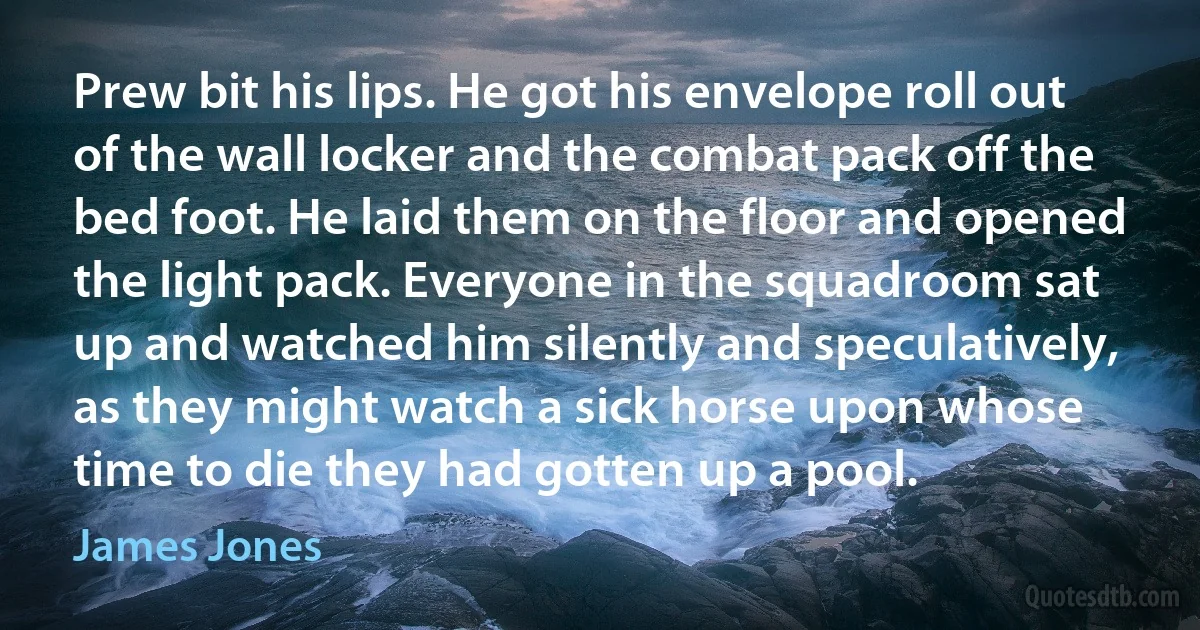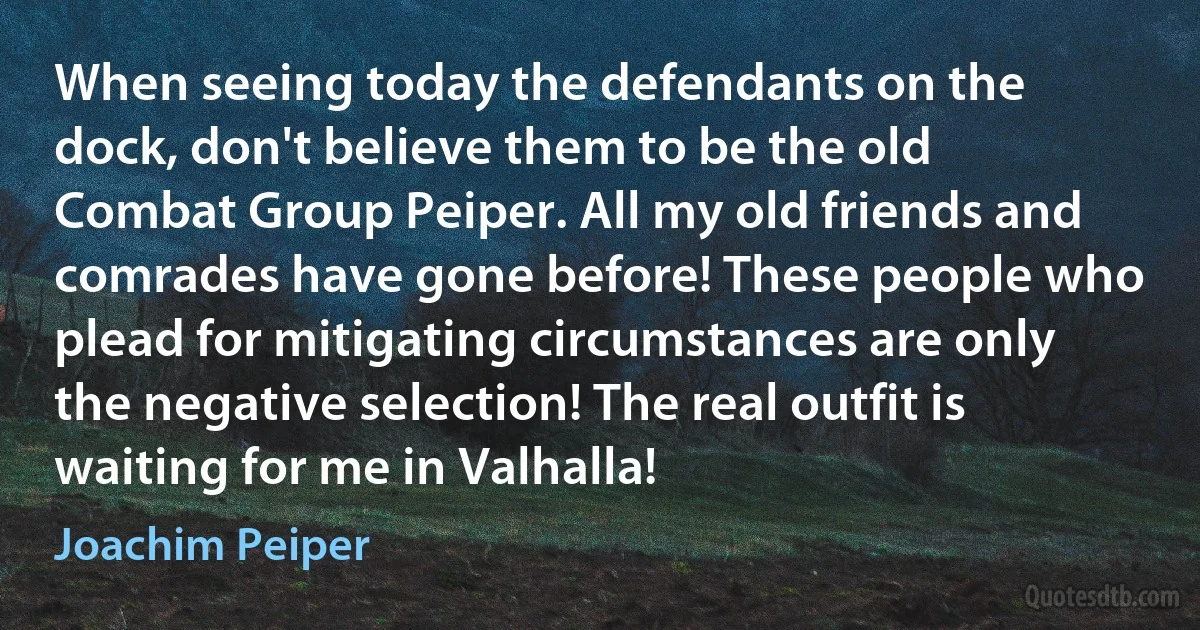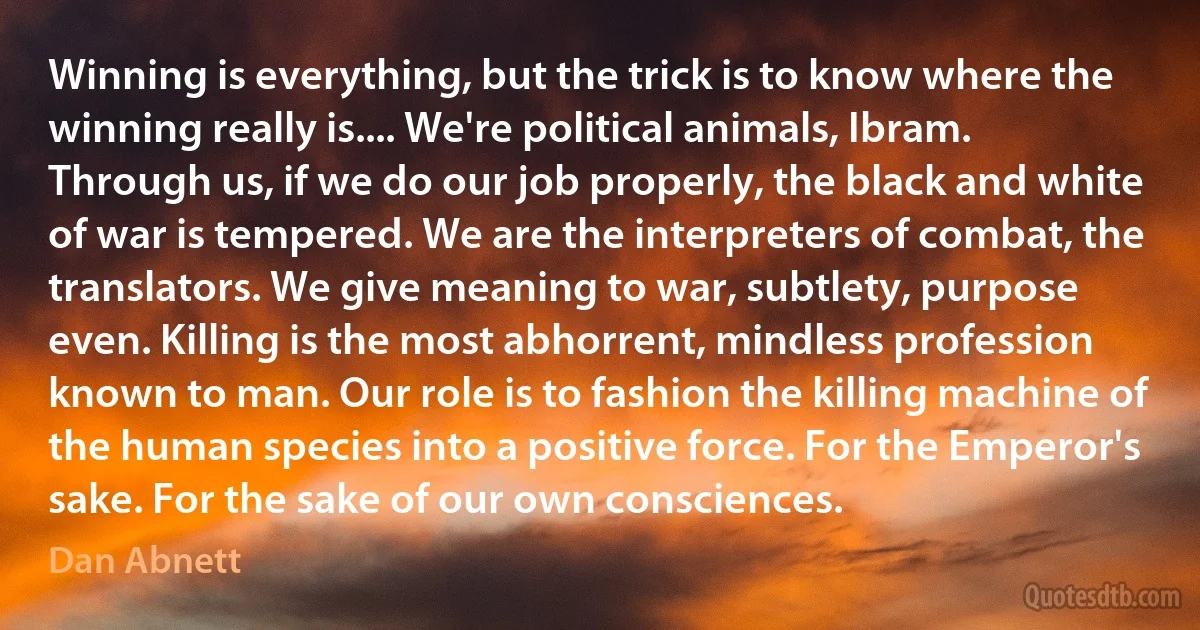Combat Quotes - page 7
Palissy, a French writer on 'the Origin of Springs from Rain-water' and of other scientific works, undertook, in 1580, to combat the notions of many of his contemporaries in Italy, that petrified shells had all been deposited by the universal deluge. 'He was the first,' said Fontenelle, when, in the French Academy, he pronounced his eulogy nearly a century and a half later, 'who dared assert' in Paris, that fossil remains of testacea and fish had once belonged to marine animals.

Charles Lyell
We who combat them are "the eternal enemies of order.". We are-for they can as yet find nothing but this worn-out word-we are demagogues. In the language of the Duke of Alva, to believe in the sacredness of the human conscience, to resist the Inquisition, to brave the state for one's faith, to draw the sword for one's country, to defend one's worship, one's city, one's home, one's house, one's family, and one's God, was called vagabondism... The man is a demagogue in the nineteenth century, who in the sixteenth would have been a vagabond.

Victor Hugo
When a man hath no freedom to fight for at home,
Let him combat for that of his neighbours;
Let him think of the glories of Greece and of Rome
And get knock'd on the head for his labours.
To do good to mankind is the chivalrous plan,
And is always as nobly requited;
Then battle for freedom wherever you can.
And, if not shot or hang'd, you'll get knighted.

Lord Byron
A proper measure of democracy should be put into effect in the army, chiefly by abolishing the feudal practice of bullying and beating and by having officers and men share weal and woe. Once this is done, unity will be achieved between officers and men, the combat effectiveness of the army will be greatly increased, and there will be no doubt of our ability to sustain the long, cruel war.

Mao Zedong
Vainglory, however, no matter how much medieval Christianity insisted it was a sin, is a motor of mankind, no more eradicable than sex. As long as combat was desirable as the source of honor and glory, the knight had no wish to share it with the commoner, even for the sake of success.

Barbara Tuchman
Based on the metaphysical implications of the Dadaist dogma.... Arp's Reliefs [carvings] between 1916 and 1922 are among the most convincing illustrations of that anti- rationalistic era... Arp showed the importance of a smile to combat the sophistic theories of the moment. His poems of the same period stripped the word of its rational connotation to attain the most unexpected meaning through alliteration or plain nonsense.

Marcel Duchamp
The characteristics of the struggle, in which territory had to be given to the enemy and many years had to pass in order to achieve final victory, with fluctuations, ebb and flow, was that of a protracted war. During the entire struggle one could say that the front lines were where the enemy was. At a given moment, the enemy occupied almost the entire territory and the front was spread to wherever the enemy was. Later the lines of combat were delimited and a main front was established. But the enemy's rear guard constituted another front; it was a total war and the colonialists were never able to mobilize their forces with ease against the liberated zones. The slogan "dynamism, initiative, mobility, and quick decision in new situations" is in synthesis the guerrilla tactic. These few words expressed the tremendously difficult art of popular war.

Che Guevara
Look at the budget that was just proposed in Washington. It is an attack of unimaginable cruelty on the most vulnerable among us, the youngest, the oldest, the poorest, and hard-working people who need a little help to gain or hang on to a decent middle-class life. It grossly underfunds public education, mental health, and efforts even to combat the opioid epidemic. And in reversing our commitment to fight climate change, it puts the future of our nation and our world at risk. And to top it off, it is shrouded in a trillion-dollar mathematical lie. Let's call it what it is. It's a con. They don't even try to hide it.

Hillary Clinton
You're probably right,” sighed Vance. "I haven't any coruscatin' arguments to combat you with. Only, I'm disappointed. I don't like anticlimaxes, especially when they don't jibe with my idea of the dramatist's talent. Pardee's death at this moment is too deuced neat-it clears things up too tidily. There's too much utility in it, and too little imagination.

S. S. Van Dine
Then he rises from the table and goes out into the Garden of Gethsemane; there he sinks down – oh, that it had happened already! He sinks down, doomed (dodsens) – indeed, was he really any more a dying man (Doende) on the cross than in Gethsemane! If the suffering on the cross was a death agony – ah, this agony in prayer was also a mortal combat; nor was it bloodless, for his sweat fell like drops of blood to the earth.

Søren Kierkegaard
Yasuji Okamura, commander of the Japanese forces in China, had this to say about the Chinese Nationalist Army: "The center of resistance was neither the four hundred million Chinese civilians, nor the two million-strong ragtag army composed of local troops. Instead, it was the Central Army, led by the young officers of the Whampoa Military Academy, with Chiang Kai-shek at its nucleus. In numerous major battles, the Central Army not only was the main force engaged in combat, but also oversaw the local troops who were increasingly losing the will to fight. The Central Army kept the local troops from wavering. As seen, training by Whampoa was thorough, and it was impossible to resolve the China Incident peacefully with the existence of such an army.

Yasuji Okamura
The terrible situation of the country makes my mind restless and I cannot keep silent. Meaningless ritual keep the Hindus divided in hundred sects. Sop we are suffering from series of defeats. We are tired and worn-out by the fortunes by the internal external enemies. The Muslims are united in religion and rituals. The Bengali Muslims the South Indian Muslims and even the Muslims outside India-all are united. They always stand untied in face of danger. The broken and divided Hindus will not be able to combat them. Days are coming when the Hindus will be again humiliated by the Muslims. "You are a mother of children, one day you will die, passing the future of Hindus society on the weak shoulders of your children, but think about their future."

Rabindranath Tagore



